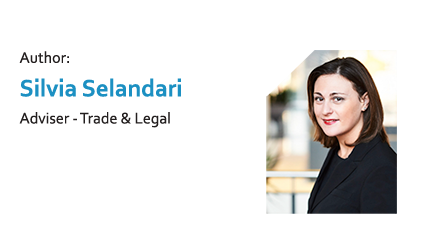Does the Product Liability Directive ensure that consumers can trust our tech products?
29 September 2020
In this post, Silvia Selandari, Orgalim adviser and member of the European Commission’s Expert Group on liability and new technologies, discusses whether the current liability regime can answer the questions linked to new technologies such as AI.

In recent years it has been my pleasure to discuss liability-related topics of tech products at the highest political level. This issue has a bigger impact on our daily lives than we think. To take an example from my summer holiday: I was in the mountains and I decided to embark in a new adventure – paragliding. As I was waiting for the instructor to assemble the paraglide, I started thinking about the trust I had in both the instructor and the paraglide.
Of course, I took a deep breath, started running when the instructor told me to, and enjoyed the 20-minute flight with a breath-taking view over the Alps. At the same time, there were very brief moments in which I thought: "what if something goes wrong?".
Similarly as a member of the European Commission’s Expert Group on liability and new technologies, I see first-hand how consumers’ trust in tech products such as AI is of paramount importance. Only if consumers trust our cutting-edge tech products will they buy and use them. In order to foster trust, we need to assess if the existing framework on safety and liability answers all the additional questions raised by new technologies such as AI.
Regarding liability, we have the Product Liability Directive, which is a legislative framework that aims at protecting the consumer. In cases where sectorial legislation such as the Machinery Directive, the Low Voltage Directive, the Radio Equipment Directive, the Electromagnetic Compatibility Directive etc. have failed to prevent an accident from happening, it covers the extra-contractual responsibility of the producer.
I think that the Product Liability Directive, thanks to its technology-neutral provisions, has created legal certainty while enabling technological innovation over the past years. In this context, I believe that the Directive will continue to provide a balanced and fair framework, in terms of liability, for damage caused by a defective product, including an AI-powered smart product. As it is always good to clarify some concepts, I welcome the upcoming European Commission guidelines, planned for the second half of 2020, which will specify the scope of the Directive for smart products.
Personally, only because I trusted my instructor and the paraglide, did I manage to pursue Icarus’s dream of flying. Similarly, only if consumers keep trusting our cutting-edge tech products will they continue to use them.
I look forward to continuing discussions on this and other key topics related to liability and AI at the next Commission Expert Group meeting on liability and new technologies.
You can read here the Orgalim priorities on liability.
